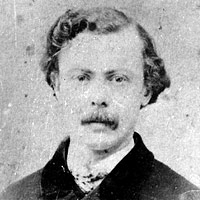
Henry Hotze
Although Henry Hotze was born in Switzerland, he moved to Mobile, Alabama, in his youth. By the age of 24 he was back in Europe serving as secretary of the United States Legation in Brussels, Belgium, and the following year was hired as the associate editor of the Mobile Register and became a successful journalist.
Owing to his experiences in European diplomacy, combined with success in journalism, the Confederate Government sent him to London as their commercial agent, chiefly to deal in propaganda and lobbying. The early stages of his deployment saw him infiltrate leading London newspapers, including The Times, Morning Post (‘organ’ of Lord Palmerston) and The Standard (present-day Evening Standard) by a combination of paying British journalists to write pro-Confederate articles, or even ghost-writing them himself.
His largest project was creating his own weekly journal, The Index: A Weekly Journal of Politics, Literature & News devoted to the exposition of the mutual interests, political & commercial, of Great Britain & the Confederate States of America. The newspaper was funded by the Confederate Government and Hotze served as editor, though his entire staff was British.
The Index was moderately successful, appealing to the upper classes and counting dozens of Members of Parliament as subscribers, including Lord Campbell who stated in the House of Lords that the Southern journal provided ‘a more lively and dramatic view of that extraordinary contest than any other source of printed information’. The secretary and son of the US Minister to London, Henry Adams, also read The Index and sent copies to his brother, Charles Francis Adams, Jr, stating, ‘I thought you would find more interesting this week than any other newspaper I can send.’ During the second half of the war, The Index served as organ of the London and Manchester branches of the Southern Independence Association. By war’s end, The Index had offices in London, Paris, and Turin.
After the war, Hotze opted to not return to the United States, instead moving to Paris, where he became the newest partner of Martini, Tanner & Co. (latter penned ‘Martini, Hotze & Co.’) trading weaponry. He eventually moved back to Zug, Switzerland, where he died in 1887.
